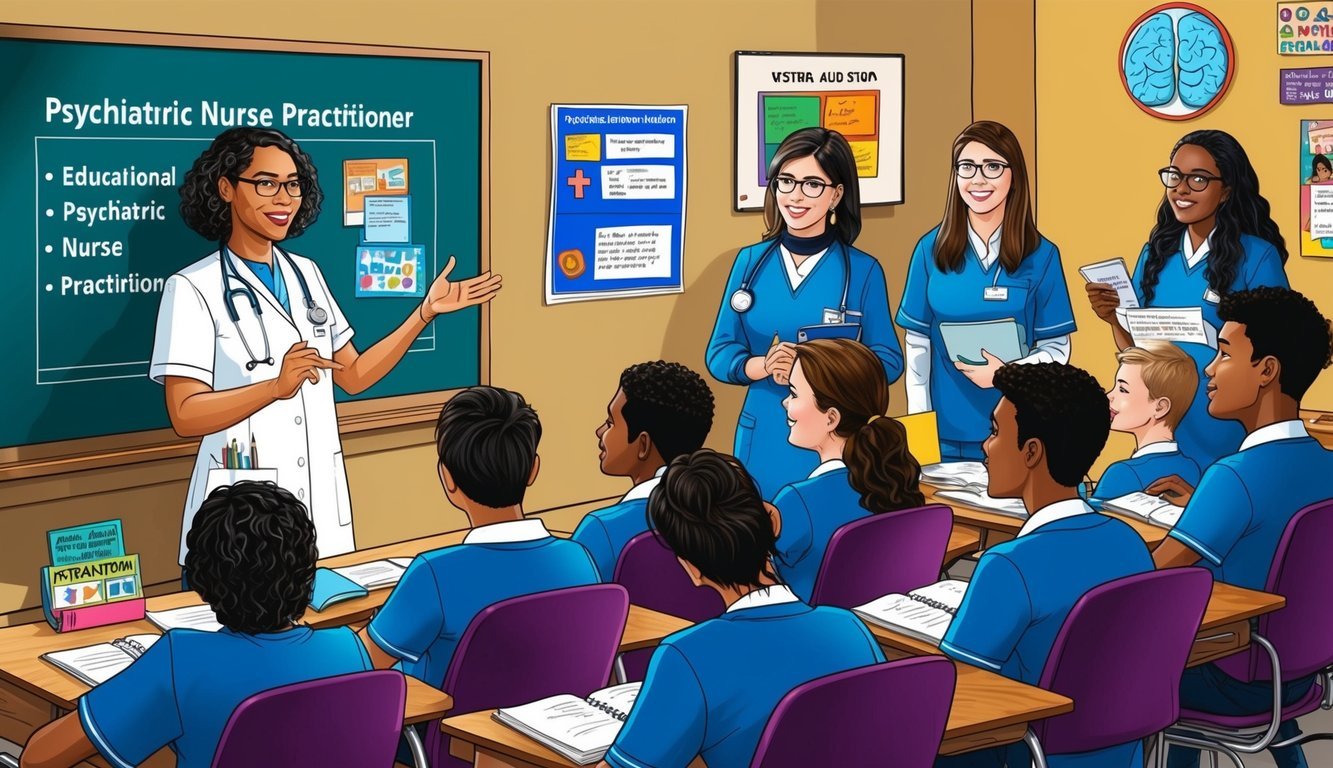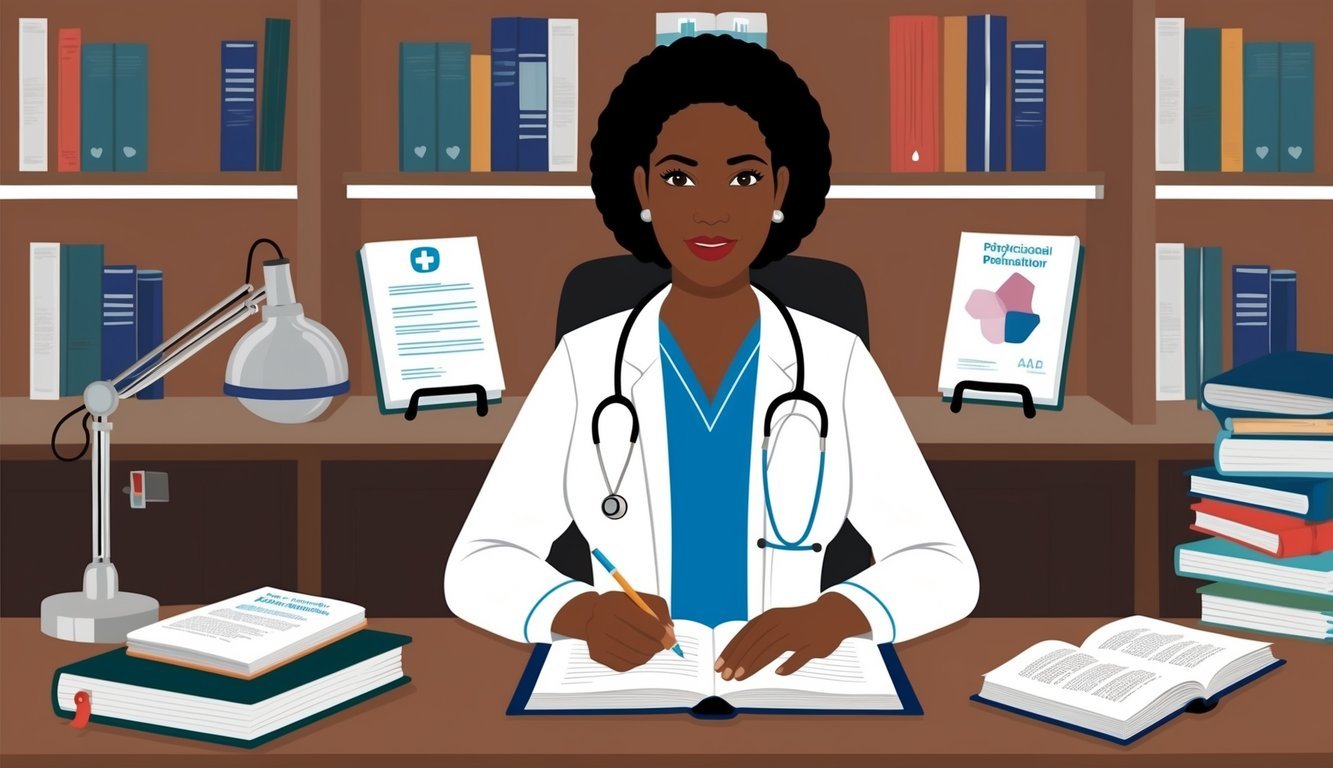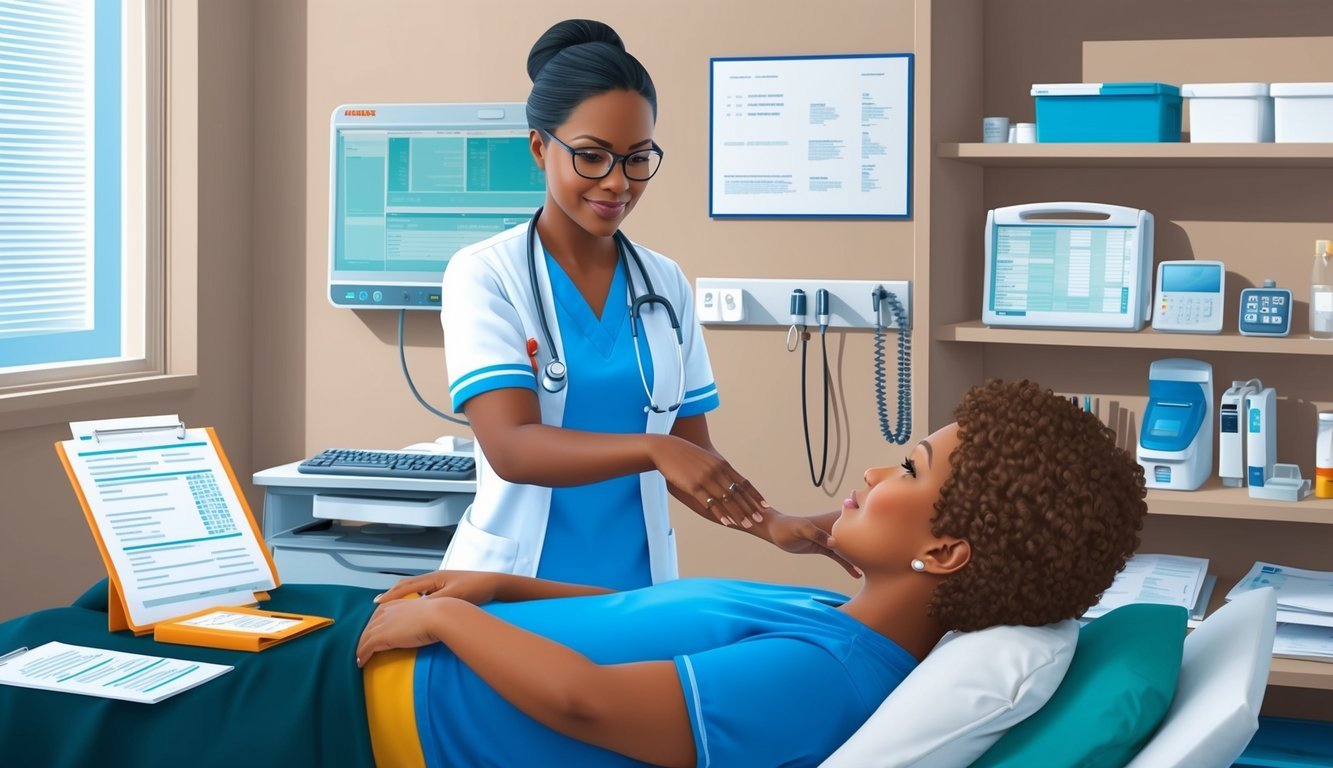Becoming a psychiatric nurse practitioner (PMHNP) offers a fulfilling career path for those interested in mental health treatment and patient care. To embark on this journey, you need to complete an accredited nursing program, obtain RN licensure, and further your education with a master’s or doctoral degree focused on psychiatric mental health. This role allows you to assess, diagnose, and treat various mental health conditions through both medication management and therapy techniques.
Your educational journey includes gaining substantial clinical experience.
This typically requires at least two years in nursing before pursuing a PMHNP program.
You will engage in hands-on training in settings like inpatient psychiatric units and outpatient facilities.
After completing your advanced degree, obtaining certification is essential to practice as a psychiatric nurse practitioner, and you’ll be prepared to make significant contributions to mental health care.
The demand for skilled PMHNPs continues to grow as awareness and need for mental health support increase.
This profession not only provides the opportunity to make a positive impact on individuals’ lives but also offers the chance for a rewarding career in a field dedicated to improving mental well-being.
For detailed steps and resources on how to become a psychiatric nurse practitioner, consider exploring nurse.org.
Educational Pathways

Becoming a psychiatric nurse practitioner involves specific educational steps designed to equip you with the necessary skills and qualifications.
Understanding these pathways is crucial for your professional journey in mental health care.
Undergraduate Nursing Programs
The foundational step in your journey is obtaining a Bachelor of Science in Nursing (BSN).
This program typically spans four years and provides essential training in nursing theories, clinical skills, and patient care.
You’ll learn through a mix of classroom instruction and hands-on clinical experiences.
To practice as a registered nurse (RN), you must pass the NCLEX-RN exam after completing your BSN.
In addition, you might consider an Associate Degree in Nursing (ADN), which takes about two to three years.
However, a BSN is often preferred and may provide better opportunities for advancement and a smoother transition into graduate programs.
Graduate Nursing Degrees
Once you hold a BSN and have relevant RN experience, pursuing a graduate degree is the next vital step.
Most programs require a Master of Science in Nursing (MSN) or a Doctor of Nursing Practice (DNP) degree focused on psychiatric mental health.
The MSN program usually takes two years and combines advanced nursing practice with psychiatric training.
DNP programs focus on clinical practice and typically extend beyond the MSN, often emphasizing leadership roles in health care.
Both pathways prepare you for licensure as a psychiatric nurse practitioner and require you to pass national certification exams.
Specialized Psychiatric Nurse Practitioner Programs
Specialized programs are essential for your development as a psychiatric nurse practitioner.
These programs are geared towards advanced practice and often align with specific accreditation standards, such as those from the Commission on Collegiate Nursing Education (CCNE).
Enroll in a program that offers rigorous clinical placements, focusing on diagnosing and treating mental health conditions.
Programs often provide a mixture of coursework in pharmacology, psychotherapy, and health policy.
Completing these specialized pathways will qualify you for certification as a psychiatric mental health nurse practitioner (PMHNP), enhancing your ability to provide comprehensive mental health care.
Licensure and Certification

To become a psychiatric nurse practitioner (PMHNP), you need to complete two critical steps: obtaining a Registered Nurse (RN) license and achieving board certification as a psychiatric-mental health nurse practitioner.
Each step has specific requirements and processes that are essential for your career advancement in this field.
Registered Nurse Licensure
The first step in your journey is securing your RN license.
To do this, you must complete an accredited nursing program, which may be an associate or bachelor’s degree in nursing.
After completing your degree, you must pass the National Council Licensure Examination for Registered Nurses (NCLEX-RN).
Here’s a quick reference of the steps for RN licensing:
| Step | Description |
|---|---|
| 1. Complete Education | Earn an accredited nursing degree. |
| 2. Pass NCLEX-RN | Successfully complete the NCLEX-RN examination. |
| 3. Apply for State Licensure | Submit an application to your state nursing board. |
| 4. Maintain Licensure | Complete continuing education requirements. |
Each state has its own requirements, so it’s essential to check with your state board of nursing for specifics.
Board Certification for Psychiatric-Mental Health Nurse Practitioners
Once you obtain your RN license, the next step is to become board certified as a PMHNP.
This certification is crucial for establishing your competence in psychiatric nursing.
The certification is awarded by the American Nurses Credentialing Center (ANCC) after you successfully pass the PMHNP certification exam.
The certification process includes:
| Requirement | Description |
|---|---|
| Eligibility | Minimum of a master’s degree in nursing. |
| Clinical Hours | 500 supervised clinical hours in psychiatric nursing. |
| Exam Preparation | Review material is available through the ANCC. |
| Certification Renewal | Every five years, you must renew certification through continuing education. |
Acquiring the PMHNP-BC credential validates your skills in providing psychotherapy and advanced nursing care to patients with mental health issues.
You can find more information about the exam and preparation resources through the American Association of Nurse Practitioners.
Clinical Experience and Specialization

Clinical experience is a vital component in your journey to become a psychiatric nurse practitioner.
It not only enhances your skills but also helps you specialize in various areas within psychiatric nursing.
This section outlines the necessary elements of clinical experience, including supervised clinical hours, advanced practice training, and areas of subspecialization.
Supervised Clinical Hours
You must complete a minimum of 500 supervised clinical hours in a psychiatric setting.
This hands-on experience is crucial for developing your clinical expertise.
During these hours, you will engage in critical patient care activities such as psychiatric assessments, diagnosing, and treating mental health disorders.
Your clinical experience should ideally span various environments, including inpatient facilities and outpatient clinics.
Each setting provides unique patient interactions that enhance your understanding of different mental health issues.
Supervision by experienced practitioners enables you to refine your skills while adhering to best practices in psychiatric nursing.
Advanced Practice Training
After obtaining your RN license, you’ll enter an advanced practice program that typically covers advanced pharmacology and pathophysiology.
This training equips you to manage complex patient cases effectively.
You will explore advanced topics such as neurobiological and psychosocial aspects of psychiatric conditions.
In these programs, you will engage in coursework that includes both theoretical and practical components.
Regular clinical rotations will allow you to apply what you learn in the classroom directly to patient care scenarios.
Mastery of these areas is essential for diagnosing and treating patients accurately.
Subspecialties in Psychiatric Nursing
Psychiatric nursing offers numerous subspecialties that allow you to focus on specific patient populations or issues.
These may include child and adolescent psychiatry, geriatric psychiatry, or substance abuse treatment.
Each subspecialty requires tailored training and knowledge to meet diverse patient needs effectively.
Specializing can enhance your career opportunities and allow you to make a more significant impact in the field.
As you refine your focus, consider additional certifications that may augment your clinical qualifications.
Staying current with advancements in psychiatric care through continual education and training is vital for your success.
Professional Skills and Knowledge
To effectively serve as a psychiatric nurse practitioner, you must cultivate a variety of essential skills and knowledge areas.
Proficiency in diagnosing mental health disorders, understanding pharmacology, and implementing psychotherapy techniques are crucial for delivering comprehensive care.
Diagnosing and Treatment Planning
You will need to develop strong diagnostic skills to identify various mental health disorders, such as anxiety, depression, bipolar disorders, and schizophrenia.
This involves gathering patient histories, conducting assessments, and utilizing diagnostic criteria from resources like the DSM-5.
Once a diagnosis is established, creating a detailed treatment plan is vital.
This plan should include specific goals, interventions, and timelines to monitor progress.
Collaboration with other healthcare professionals can enhance treatment efficacy.
Always consider individual patient preferences and needs when formulating treatment plans.
Pharmacology and Psychopharmacology
A solid understanding of pharmacology is essential for prescribing and managing medications for various mental health conditions.
Familiarize yourself with commonly used medications, their indications, dosages, and side effects.
You will encounter medications such as antidepressants, antipsychotics, mood stabilizers, and anxiolytics.
Staying updated on recent advancements in psychopharmacology enables you to tailor medication regimens to improve patient outcomes.
Be prepared to monitor patients for medication efficacy and manage side effects, adjusting plans as necessary.
Psychotherapy and Counseling Techniques
Equipped with effective psychotherapy and counseling techniques, you will support patients in navigating their mental health challenges.
Familiarize yourself with various approaches, including Cognitive Behavioral Therapy (CBT), Dialectical Behavior Therapy (DBT), and supportive therapy.
Recognizing the nuances of patient interaction is crucial.
Building rapport and establishing trust will enable effective communication.
You should also develop skills in conducting individual and group therapy sessions, focusing on trauma-informed care for those with a history of trauma or substance abuse.
Engage continuously in professional development to refine these skills over time.
Career Outlook and Opportunities
The career outlook for psychiatric nurse practitioners (PMHNPs) is promising, driven by the increasing demand for mental health services.
As you navigate this profession, understanding employment settings, advancement opportunities, and salary expectations is crucial for your success.
Employment Settings
As a psychiatric nurse practitioner, you can find diverse employment opportunities across various settings.
Common workplaces include:
| Employment Settings | Description |
|---|---|
| Hospitals and In-patient Facilities | Work within critical care units, providing treatment to patients with severe mental health conditions. |
| Community Mental Health Centers | Engage in outpatient care, helping to address ongoing mental health issues. |
| Private Psychiatric Practices | Offer personalized care within smaller, independent settings. |
| Correctional Facilities | Provide mental health services to incarcerated individuals, often requiring a specialized approach. |
| Schools | Collaborate with educational staff to support students facing mental health challenges. |
Each setting allows you to apply your skills while addressing the diverse needs of various populations.
Career Advancement and Specialization
As a PMHNP, you can achieve career advancement through further certifications and specialized training.
Options for specialization may include:
- Subspecialties: Focus on areas like child and adolescent psychiatry, geriatric psychiatry, or substance abuse treatment.
- Leadership Roles: Pursue positions such as clinical director or supervisor.
- Education and Consulting: Engage in teaching roles at institutions like Walden University or Purdue Global.
Collaborating with other healthcare professionals, including psychiatrists and physicians, can enhance your knowledge and effectiveness in treating complex mental health conditions.
Salary Expectations and Job Stability
Recent data shows that psychiatric nurse practitioners can expect competitive salaries.
These salaries increase with experience.
Here’s a breakdown:
| Experience Level | Average Salary |
|---|---|
| Less than 1 year | $105,794 |
| 1-4 years | $118,742 |
| 5-10 years | Varies, generally higher |
The demand for PMHNPs has surged due to a growing awareness of mental health issues.
This ensures job stability.
As you become a compassionate advocate in the field, your empathy and patience will be essential traits that contribute to your long-term career success.

